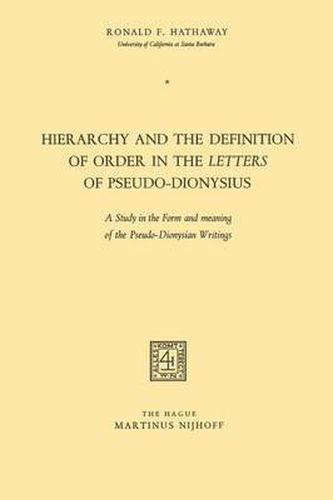Hierarchy and the Definition of Order in the Letters of Pseudo-Dionysius: A Study in the Form and meaning of the Pseudo-Dionysian Writings
Ronald F. Hathaway

Hierarchy and the Definition of Order in the Letters of Pseudo-Dionysius: A Study in the Form and meaning of the Pseudo-Dionysian Writings
Ronald F. Hathaway
This title is printed to order. This book may have been self-published. If so, we cannot guarantee the quality of the content. In the main most books will have gone through the editing process however some may not. We therefore suggest that you be aware of this before ordering this book. If in doubt check either the author or publisher’s details as we are unable to accept any returns unless they are faulty. Please contact us if you have any questions.
N eoplatonism begins explicitly with Plotinus in the third century of our era. The later Neoplatonism of the fifth and six century schools at Athens and Alexandria was both the continuation of the philosophy of Plotinus and also a pagan ideology. When these schools were closed, despite attempts at compromise at Alexandria and as a result of direct and indirect political pressures and actions, pagan ideology died. Many philosophers, such as Isidore, Asclepiodotus, Damascius, and Olym piodorus, must have foreseen the danger to philosophy, and their extant writings are sprinkled with forebodings. Would the death of pagan ideology, in the form of pagan worship and the Homeric and Orphic traditions, bring about the death of all genuine philosophy as well? One answer to this great question is found in the enigmatic writings of Ps. -Dionysius the Areopagite. Purposing to be the writings of the Athenian convert of St. Paul, they fall within the province of a multitude of so-called pseudepigraphic Christian writings. 1. GENERAL ARGUMENT I embarked on the study of Ps. -Dionysius’ Letters with two goals in mind: ® to grasp in clear detail the unknown author’s philosophic intentions in writing his famous Corpus and the way in which he set about writing, and (2) to attempt to see with precision the reason for the absence of a political philosophy in Christian Platonism. The Letters provided a richness of detail and information bearing on the first subject which was wholly unexpected.
This item is not currently in-stock. It can be ordered online and is expected to ship in 7-14 days
Our stock data is updated periodically, and availability may change throughout the day for in-demand items. Please call the relevant shop for the most current stock information. Prices are subject to change without notice.
Sign in or become a Readings Member to add this title to a wishlist.


